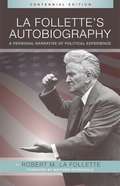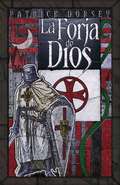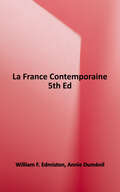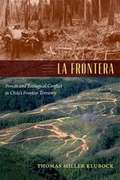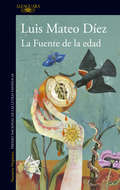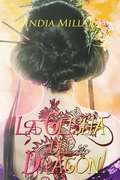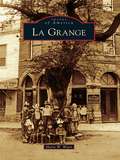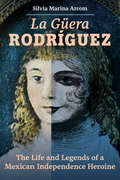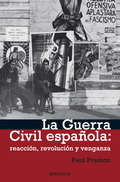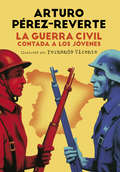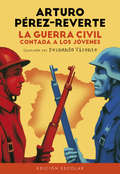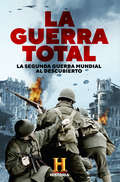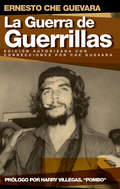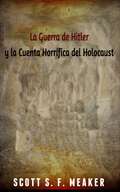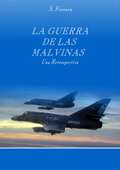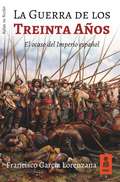- Table View
- List View
La Follette's Autobiography
by Robert M. La FolletteWritten in lucid, vigorous prose, "La Follette""'s Autobiography" is the famous Wisconsin senator's own account of his political life and philosophy. Both memoir and a history of the Progressive cause in the United States, it charts La Follette's formative years in politics, his attempts to abolish entrenched, ruthless state and corporate influences, and his embattled efforts to advance Progressive policies as Wisconsin governor and U. S. senator. With a new foreword by Matthew Rothschild, editor of "The Progressive"--the magazine that La Follette himself founded--the "Autobiography" remains a powerful reminder of the legacies of Progressivism and reform and the enduring voice of the man who fought for them.
La Forja De Dios
by Patrick Dorsey Rocío Gutiérrez"La rapidez de su historia te mete de lleno en la trama..." - Sociedad de Novela Histórica"¡Es una gran historia!... Disfruté como nunca leyendo La forja de Dios." - Ashley LaMar, Closed the CoverLos Caballeros Templarios fueron los guerreros más temibles de las Cruzadas; una legión de monjes guerreros de élite que escribieron su leyenda en las arenas de Oriente Medio con su sangre y la de sus enemigos.Tras volver de las Cruzadas y ser destinado a París, la desilusión del hermano William por la Orden ha llegado a tal punto que planea abandonarla. Pero cuando las tropas reales toman la fortaleza de París, William lidera un pequeño grupo de templarios y huye al resguardo de la noche. Luchando, corriendo e intentando comprender el mundo que ahora se ha vuelto contra ellos, se topan con una joven seductora que les acompaña a descubrir verdades oscuras sobre la ciudad cada vez más hostil, sus reglas y la iglesia que han jurado defender... todo ello en una huída acelerada que dejará las calles de París cubiertas de sangre.
La Formula del Caos
by Richard Stooker Luisa ErcolanoJaxon Hampton potrà mai amare la Regina della Luna abbastanza da salvare la Terra? Se Zeth, il servitore dei suoi nemici i Giganti d'Ombra, sconfigge Jaxon in battaglia i Giganti sguinzaglieranno il caos sulla Terra e distruggeranno l'umanità. Ogni notte, Jaxon fa vividi sogni ricorrenti, nei quali, 10000 anni prima, scorta una bellissima donna attraverso molti pericoli, fino alla cima di uno scoglio sul Nilo. Com'è possibile che la figlia del suo capo faccia gli stessi sogni? E perché un uomo strano ipnotizza Jaxon perché porti la ragazza su un promontorio sul fiume Mississippi, con la prossima luna piena? Jaxon lavora come operatore capo per una piccola compagnia di gestione del denaro. Il suo capo gli dice di aver inventato un sistema di scambi a prova di bomba, e la chiama la Formula del Caos. Il suo account di prova è tremendamente in positivo. Troppo. Jaxon non riesce a crederci. Il mercato azionario è il risultato di una curva casuale. Forse non una distribuzione assolutamente normale, ma impredicibile. Ma questa abilità del suo capo di predire i risultati dei mercati azionari costituisce solo un segno della realtà impazzita. Cosa spinge Jaxon a passare le sue serate a guardare la luna, fino al punto da costringere la sua ragazza a lasciarlo? Ogni notte, sogna di brandire una spada di bronzo, decimila anni indietro nel passato, alla foce del Nilo, molto prima che venissero costruite le piramidi. Combatte come soldato per il re di un impero in espansione. Gli altri soldati lo chiamano Mietitore di Sangue. Una notte, il re gli ordina di portare una giovane donna verso la sorgente del fiume, in sacrificio. Una donna stranamente bella, nonostante la pelle bianca, gli occhi blu e i capelli d'oro. Deve viaggiare fino ai promontori sul Nilo, protetta solo da Jaxon - contro animali feroci, selvaggi, e contadini superstiziosi. Jaxon non capisce perché il sacr
La France Contemporaine
by William Edmiston Annie DumenilImmerse yourself in the France of today with this text, which will improve your understanding of the Francophone world and your communication in French, using up-to-date information on the political, social, technological, economic, and rich cultural forces that affect this fascinating country and its people. End-of-chapter comprehension and discussion activities, sample quizzes, and an integrated companion website help you master the material and fully appreciate everything that makes France French.
La Frontera: Forests and Ecological Conflict in Chile’s Frontier Territory
by Thomas Miller KlubockIn La Frontera, Thomas Miller Klubock offers a pioneering social and environmental history of southern Chile, exploring the origins of today's forestry "miracle" in Chile. Although Chile's forestry boom is often attributed to the free-market policies of the Pinochet dictatorship, La Frontera shows that forestry development began in the early twentieth century when Chilean governments turned to forestry science and plantations of the North American Monterey pine to establish their governance of the frontier's natural and social worlds. Klubock demonstrates that modern conservationist policies and scientific forestry drove the enclosure of frontier commons occupied by indigenous and non-indigenous peasants who were defined as a threat to both native forests and tree plantations. La Frontera narrates the century-long struggles among peasants, Mapuche indigenous communities, large landowners, and the state over access to forest commons in the frontier territory. It traces the shifting social meanings of environmentalism by showing how, during the 1990s, rural laborers and Mapuches, once vilified by conservationists and foresters, drew on the language of modern environmentalism to critique the social dislocations produced by Chile's much vaunted neoliberal economic model, linking a more just social order to the biodiversity of native forests.
La Fuente de la edad
by Luis Mateo DíezCon La fuente de la edad, Luis Mateo Díez, uno de los mayores narradores españoles contemporáneos, obtuvo el Premio de la Crítica y el Premio Nacional de Literatura. Corren los penosos años cincuenta en una ciudad de provincias sumida en la penuria y el olvido. Los integrantes de una peculiar Cofradía --más encaminada a lo etílico y a lo esotérico que a los rigores de la penitencia-- inician una noche una disparatada aventura, dirigida al hallazgo de una mítica fuente de aguas virtuosas, de la que un día bebió, a lo que parece, un eximio canónigo de dilatada memoria. La aventura de los cofrades marcará la línea simbólica a partir de la cual se abrirá una vía de escape del mundo estrecho y ramplón que les rodea. Y ese será, naturalmente, el tema sustancial de la novela: el enfrentamiento entre la vida real y la imaginaria, la lucha entre el disparate --teñido también de inocencia-- y lo convencionalmente establecido por una sociedad sin imaginación. Reseñas:«Después de Delibes, no hay prosa más precisa, elegante y pura que la de Luis Mateo Díez.»J. A. Masoliver Ródenas, La Vanguardia «Luis Mateo Díez insiste en su búsqueda de la perfección y demuestra por qué es uno de los escritores españoles más importantes del momento.»Ernesto Ayala-Dip, Babelia «Es uno de los grandes escritores europeos de nuestro tiempo.»José María Pozuelo Yvancos, ABC de las Letras «Es un contador de historias ejemplar.»Enrique Turpin, El Periódico «No existe en este momento en la literatura española, ni entre los veteranos ni entre los más jóvenes, un escritor con tanta capacidad para inventar personajes como Luis Mateo Díez.»José María Merino, La Crónica 16 «En ocasiones su capacidad de inventiva, siempre capaz de una meta nueva y de un sesgo narrativo insospechado, lo emparenta directamente con los grandes fabuladores, en la línea de Italo Calvino, Claude Simon o Günter Grass.»Adolfo García Ortega
La Geisha Que No Podía Sentir Dolor
by India MillarDe todas las geishas, solo la rareza de Mineko permanecía oculta al mundo. Mineko era la geisha que no podía sentir dolor. Era la geisha a la que ningún hombre podía hacer daño, sin importar cuánto lo intentara. Y no solo era Mineko incapaz de sentir dolor físico, también era incapaz de sentir emociones como el amor, el deseo o el anhelo. Hasta que conoció al samurái que se convertiría en su amante; el hombre que, exactamente igual que ella, era propiedad en cuerpo y alma del amo de Mineko, el terrible yakuza Akira. Al tiempo que sus deseos son despertados por Ken, su amante samurái, Mineko comienza a soñar con otra vida, una vida libre. En esta, la segunda parte de la serie “Secretos de la Casa Escondida”, se revelan los terribles misterios que subyacen en el corazón de la Casa Escondida. El pasado y el presente se entremezclan, cada secreto más profundo y oscuro que el anterior. El enigma que representa la Casa Escondida despliega los pétalos de su historia aquí, en la historia de Mineko.. La historia de la Geisha Que No Podía Sentir Dolor. Esta es la segunda historia de la Casa Escondida, pero es también una novela que puede ser leída de forma independiente.
La Geisha de Ojos Verdes
by India MillarDescripción de la novela: Antes de 1850, Japón había estado cerrado para el mundo exterior durante siglos. Era un mundo secreto, oculto. Y dentro de Edo (el actual Tokio) se encontraba Yoshiwara, “El Mundo Flotante”. El centro del placer. Y dentro de Yoshiwara estaba la Casa Escondida. El lugar que solo los más adinerados podían permitirse. El lugar donde las geishas eran…especiales. Y en la Casa Escondida vivía Midori No Me. Mitad japonesa, mitad bárbara extranjera, nacida en cautividad. Adiestrada para dedicar su vida a servir a los hombres más ricos de Japón. Mancillada a los trece, cuando su virginidad fue vendida al mayor postor. Poseída por el mayor actor del teatro kabuki. Robada a este por el yakuza más poderoso de Edo. La geisha que escapó del Mundo Flotante. La Geisha de Ojos Verdes.
La Geisha del Dragón: Un Romance Histórico Japonés
by India MillarUn Nuevo mundo lleno de hermosas posibilidades, pero las viejas cicatrices son profundas. Midori No Me, la Geisha de Ojos Verdes, ha escapado por fin del Mundo Flotante y se encuentra viviendo su sueño al actuar en una compañía kabuki mientras viaja por los Estados Unidos. Pero no puede huir de los fantasmas del pasado. La envidia y el engaño amenazan la nueva vida que intenta construir. Y al conocer la crueldad que su antiguo amo, el yakuza Akira, está imponiendo a sus amigas en Edo, no puede ignorar el sufrimiento de estas. Debe de algún modo encontrar el valor para volver a aventurarse en el Mundo Flotante para aydar a otras a escapar de la prisión que en otro tiempo fue la suya propia. La Geisha de Ojos Verdes debe convertirse en La Geisha del Dragón. La Geisha del Dragón es el tercer libro de la serie los Secretos De La Casa Escondida, pero puede ser leída independientemente.
La Gente del Fiume
by Kristen James Yelena FiorettiIl padre di Canto del Fiume, Pensatore Seduto, ogni giorno diventa sempre più vecchio e malato, ma ha fiducia in lei; sarà capace di guidare la loro gente. La sua migliore amica è diventata ora la sua rivale, dal momento che entrambe vogliono sposare il figlio del grande capo. Ma, quando Canto del Fiume si mette alla prova per lui, comincia a capire che non è l'uomo che pensava che fosse. E quando un gruppo errante giunge da loro alla ricerca di una nuova casa, lei deve usare il suo donno: quello della parola. Canto del Fiume si sente attratta dal loro capo, ma, allo stesso tempo, non sa quale sia la sua posizione all'interno della tribù. Riuscirà, questa giovane donna, a tenere unita la sua tribù dopo l'arrivo dei nuovi guerrieri e, poi, quando dei guerrieri nemici attaccano la loro valle? Venite a conoscere la Gente del Fiume, sulla costa pacifica nord-occidentale, prima dell'arrivo dei commercianti di pellicce e dei missionari. Canto del Fiume vive una vallata piena di fiumi sinuosi che danno alla sua gente i salmoni e le trote da mangiare. Le querce abbondano in questa vallata e le foreste di cedro e di abete li circondano, come una sorta di tetto e offrendogli le assi per le loro capanne, le loro canoe e i loro totem.
La Gran Historia del Profeta Adán y de Eva (Hawa) en el Islam
by Muham Sakura Dragon Oana FialcofschiSe cree que el profeta Adán fue el primer ser humano en la tierra y el primer profeta del Islam. El papel de Adán como padre de la raza humana es visto por los musulmanes con respeto. Los musulmanes también se refieren a su mujer, Eva (Hawa), como "la madre de la humanidad". Los musulmanes ven a Adán como el primer musulmán, ya que el Corán promulga que todos los profetas predicaron la misma fe de sumisión a Dios. Su historia se narra en el Corán en numerosos lugares, aunque su relato difiere del de la Tora en algunos aspectos. Un hadiz sunita dice que mientras Adán dormía, Dios tomó una costilla suya y de ella creó a la mujer Eva; sin embargo, mientras que la creación de Adán y Eva se menciona en el Corán, no se especifica el método exacto de la creación. El Corán luego dice que Dios ordenó que Adán y Eva (Hawa) no comieran de un árbol en el cielo, pero Iblis (Lucifer de la raza de los genios) consiguió convencerles para probarlo. Fue entonces que comenzaron a cubrirse, ya que ahora sabían que sus partes pudendas eran descubiertas. Por eso, Dios expulsó a Adán y Eva a la tierra. Un hadiz sunita no-canónico también dice que Adán y Eva fueron arrojados lejos, por lo que tuvieron que buscarse uno al otro. En la teología islámica, no se cree que el pecado de Adán sea llevado por todos sus hijos. El hadiz dice que una vez que Adán estuvo en la tierra, Dios le enseñó cómo plantar las semillas y hornear pan. Eso iba a convertirse en el modo de vida de todos los hijos de Adán. Adán procedió a vivir aproximadamente 1000 años. Según la historia de Adán, la humanidad ha aprendido todo de él. Fue el primero en aprender a sembrar, cosechar y hornear, también fue el primero enseñado cómo arrepentirse y cómo enterrar adecuadamente a alguien. Dios también le reveló las diversas restricciones de alimentos y el alfabeto. Fue nombrado el primer profeta y le fueron enseñados 21 pergaminos que fue capaz de esc
La Gran Línea: Mapping the United States - Mexico Boundary, 1849-1857
by Paula RebertThe Treaty of Guadalupe Hildalgo, which officially ended the U.S.-Mexican War in 1848, cost Mexico half its territory, while the United States gained land that became California, Nevada, Utah, Texas, and parts of Colorado, Arizona, and New Mexico. Because the new United States-Mexico border ran through territory that was still incompletely mapped, the treaty also called for government commissions from both nations to locate and mark the boundary on the ground. This book documents the accomplishments of both the U.S. and the Mexican Boundary Commissions that mapped the boundary between 1849 and 1857, as well as the fifty-four pairs of maps produced by their efforts and the ongoing importance of these historical maps in current boundary administration. Paula Rebert explores how, despite the efforts of both commissions to draw neutral, scientific maps, the actual maps that resulted from their efforts reflected the differing goals and outlooks of the two countries. She also traces how the differences between the U.S. and Mexican maps have had important consequences for the history of the boundary.
La Grange (Images of America)
by Marie WattsLa Grange, voted the capital of the Republic of Texas in 1838, is as colorful and audacious as the state itself. Its citizens were instrumental in winning the republic's freedom and have always been willing to fight for their beliefs. Many defend La Grange as the true capital of Texas, unfairly stripped of its title. The town flourished during the 19th century and witnessed the birth of a rough-and-tumble society, where arguments were commonly settled with fists, knives, and guns. In later years, immigrants flocked to the area and built a strong agricultural economy. The 20th century might have passed quietly into history if not for a Houston television reporter who publicized the demise of one of Texas's best-known brothels, the Chicken Ranch, located just outside of La Grange. The extensive publicity surrounding the closing of the "Best Little Whorehouse in Texas" resulted in a musical and movie of the same name, as well as a song by ZZ Top.
La Guera Rodriguez: The Life and Legends of a Mexican Independence Heroine
by Silvia Marina ArromFact is torn from fiction in this first biography of Mexico’s famous independence heroine, which also traces her subsequent journey from history to myth. María Ignacia Rodríguez de Velasco y Osorio Barba (1778–1850) is an iconic figure in Mexican history. Known by the nickname "La Güera Rodríguez" because she was so fair, she is said to have possessed a remarkably sharp wit, a face fit for statuary, and a penchant for defying the status quo. Charming influential figures such as Simon Bolívar, Alexander von Humboldt, and Agustín de Iturbide, she utilized gold and guile in equal measure to support the independence movement—or so the stories say. In La Güera Rodríguez, Silvia Marina Arrom approaches the legends of Rodríguez de Velasco with a keen eye, seeking to disentangle the woman from the myth. Arrom uses a wide array of primary sources from the period to piece together an intimate portrait of this remarkable woman, followed by a review of her evolving representation in Mexican arts and letters that shows how the legends became ever more fanciful after her death. How much of the story is rooted in fact, and how much is fiction sculpted to fit the cultural sensibilities of a given moment in time? In our contemporary moment of unprecedented misinformation, it is particularly relevant to analyze how and why falsehoods become part of historical memory. La Güera Rodriguez will prove an indispensable resource for those searching to understand late-colonial Mexico, the role of women in the independence movement, and the use of historic figures in crafting national narratives.
La Guerra Civil Española: reacción, revolución y venganza
by Paul PrestonEdición corregida y ampliada con un capítulo inédito sobre la represión durante la guerra. En el septuagésimo aniversario del estallido del trágico conflicto español, Paul Preston, hispanista de prestigio internacional, actualizó y amplió su estudio de la Guerra Civil teniendo en cuenta tanto las últimas investigaciones y polémicas historiográficas como abundante material inédito, ofreciendo su versión definitiva de La guerra civil española. Imprescindible para conocer la violenta realidad que asoló España, este libro contribuye a conservar un relato común de aquella tragedia colectiva, algo esencial para el ejercicio cotidiano de la democracia. Reseña:«La mirada lúcida y certera de un maestro de historiadores sobre la mayor tragedia española del siglo XX.»Enrique Moradiellos
La Guerra Civil contada a los jóvenes
by Arturo Pérez-ReverteLa Guerra Civil española contada de forma escueta, objetiva y rigurosa, sin clichés partidarios ni etiquetas fáciles, en textos de Arturo Pérez-Reverte e ilustrada de forma espléndida por Fernando Vicente. «Hace casi ochenta años, entre 1936 y 1939, en tiempos de nuestros abuelos y bisabuelos, una espantosa guerra civil tuvo lugar en España. Causó miles de muertos, destruyó hogares, arruinó el país y llevó a mucha gente al exilio. Para evitar que tan desoladora tragedia vuelva a repetirse nunca, es conveniente recordar cómo ocurrió. Así, de aquella desgracia podrán extraerse conclusiones útiles sobre la paz y la convivencia que jamás se deben perder. Lecciones terribles que nunca debemos olvidar.»Arturo Pérez-Reverte Reseñas:«Un repaso equidistante por los tres años de contienda, con ilustraciones de Fernando Vicente, y donde defiende la importancia de la memoria y la necesidad de no olvidar lo que fueron aquellos tres años de barbarie.»Antonio Lucas, El Mundo «La extraordinaria belleza de las ilustraciones, además de dialogar con el texto en perfecta armonía, trasciende edades y lapsos temporales convirtiéndolo en una pequeña obra de arte, un objeto precioso, un ejercicio de memoria para que no vuelva a suceder.»Anna M. Serrano, ABC «La capacidad de síntesis y la ecuanimidad crítica del autor abonan un trabajo de lectura obligatoria.»Sergio Vila-SanJuán, La Vanguardia
La Guerra Civil contada a los jóvenes (edición escolar)
by Arturo Pérez-ReverteLa Guerra Civil española contada de forma escueta, objetiva y rigurosa, sin clichés partidarios ni etiquetas fáciles, en textos de Arturo Pérez-Reverte e ilustrada de forma espléndida por Fernando Vicente. Edición escolar que incluye una Guía de lectura para trabajar el libro en el aula. «Hace casi ochenta años, entre 1936 y 1939, en tiempos de nuestros abuelos y bisabuelos, una espantosa guerra civil tuvo lugar en España. Causó miles de muertos, destruyó hogares, arruinó el país y llevó a mucha gente al exilio. Para evitar que tan desoladora tragedia vuelva a repetirse nunca, es conveniente recordar cómo ocurrió. Así, de aquella desgracia podrán extraerse conclusiones útiles sobre la paz y la convivencia que jamás se deben perder. Lecciones terribles que nunca debemos olvidar.»Arturo Pérez-Reverte
La Guerra Interior
by John MumbaLa Guerra Interior es una historia imaginaria e ingeniosa de la creación que te lleva a la mente del Creador desde la era anterior a la formación del universo. Expone su sueño de tener una familia de muchos hijos que hereden su trono. Esta visión enciende guerras internas y conflictos entre sus criaturas. Emprende una exploración fascinante hasta la escena esotérica de María, la madre de Jesús, y el despegue de todas las personas de la tierra atribulada hacia sus tronos previstos en el paraíso por Jesús, que demuestra ser el Creador de todas las cosas y el héroe de todos. Te da una visión mental de los tiempos antiguos y lo que sucedió con fascinantes giros y vueltas.
La Guerra Total: La Segunda Guerra Mundial al descubierto
by Canal HistoriaLlega el libro de Historia que todos los seguidores estaban esperando: el relato único y fascinante de la Segunda Guerra Mundial, la contienda que cambió el mundo para siempre. Cuando el 1 de septiembre de 1939 Adolf Hitler invade Polonia, desencadena uno de los conflictos más trascendentales de la Historia: la Segunda Guerra Mundial. Por primera vez, la humanidad se enfrenta a una lucha global que abarca los cinco continentes: cientos de batallas por tierra, mar y aire que provocan millones de bajas tanto en la población civil como en la militar. Estadistas, tiranos, científicos, cineastas, filósofos, espías, héroes, asesinos... el conflicto se universaliza a todos los ámbitos de la sociedad hasta convertirse en una guerra total de la que, casi cien años después, todavía sentimos sus efectos y consecuencias. En La guerra total, Canal Historia analiza el conflicto desde sus aspectos menos conocidos: el papel de las mujeres en la lucha, la guerra de los espías, la importancia de la economía a la hora de inclinar la balanza de la victoria. Todo ello con el rigor y la amenidad habituales del sello. La Guerra Total es una visión completa y diferente sobre la Segunda Guerra Mundial.Una lección de Historia tan apasionante como el mejor relato de ficción.
La Guerra de Eve: Operación Sherlock (La Guerra de Eve, Heroínas de la DOE #5)
by Hannah HoweQuinto libro en la serie La Guerra de Eve Heroínas de la DOE La serie está estructurada en doce libros, cada uno de aproximadamente 20,000 palabras, con un intervalo aproximado de dos meses. En el dorso de cada libro, encontrará biografías cortas de los héroes y heroínas reales de la DOE, las personas en las que se basan Eve Beringar, Guy Samson y Mimi Duchamp. Ha sido un honor leer sobre estas personas increíblemente valientes y de principios. Espero que disfrutes sus historias y las hazañas de mis personajes en La Guerra de Eve.
La Guerra de Guerrillas
by Ernesto Che GuevaraA bestselling Che classic for decades, this is Che Guevara's own incisive analysis of the Cuban revolution-a text studied by his admirers and adversaries alike. Here he explains how a small, dedicated group grew in strength and with the support of the Cuban people was able to defeat a dictator's army.
La Guerra de Hitler y la Cuenta Horrífica del Holocausto
by Scott S. F. Meaker Adriana RojasMientras el poder de Hitler crecía, acorralaba a otros que él consideraba indeseables. Hitler de había convertido en un poder y la destrucción lenta de los Judíos se puso a cabo. En 1942, cerca de un millón de Judíos ya habían sido asesinados. Ejecución era sólo una forma de muerte. Dos millones y medio habían sido gaseados y medio millón muertos de hambre. Un brote de Tifoidea mato a muchos otros. Después de la victoria de los aliados, Alemania estaba en caos. Este libro es un esfuerzo de ver en el tipo de situación que llevaría a un país civilizado a permitir que un Holocausto tuviera lugar.
La Guerra de Las Malvinas: Una Retrospectiva
by S. FerraraEn contra de la creencia popular, en el efímero conflicto de las Malvinas, los británicos evitaron por poco una horrenda paliza militar, a pesar de la indiscutible superioridad tecnológica, de entrenamiento, de inteligencia y profesional de sus militares. Los argentinos lucharon muy bien, consiguiendo dañar 14 unidades militares y sólo la corta duración del conflicto evitó un desenlace final, que podría haber sido mucho más dramático para los británicos.
La Guerra de los Treinta Años: El ocaso del Imperio español
by Francisco García LorenzanaLa Guerra de los Treinta Años (1618-1648) marcó el siglo XVII y certificó el principio del fin de España como gran potencia europea y mundial, con un papel cada vez más reducido en los asuntos europeos y un imperio asediado por las nuevas potencias emergentes. El presente ensayo analiza la concatenación de guerras, conocida como la Guerra de los Treinta Años, que hace cuatrocientos años desgarró el Sacro Imperio y reconfiguró el mapa de Europa en la Paz de Westfalia de 1648. Esta guerra marcó el desarrollo del Barroco español y la última fase del Siglo de Oro, que refleja la aguda sensación de decadencia que invadió a la sociedad peninsular a medida que la suerte política y militar iba dando la espalda a la Monarquía hispánica en los campos de batalla de Europa. El mito de los Tercios de Flandes, el auge de la picaresca, la idea de Castilla contra el mundo y otros muchos mitos de la historiografía hispánica tienen su origen en este período. Un aniversario que permite una reflexión sobre el papel de España en el mundo y sobre la construcción de unos mitos históricos que han fundamentado el concepto de «decadencia».
